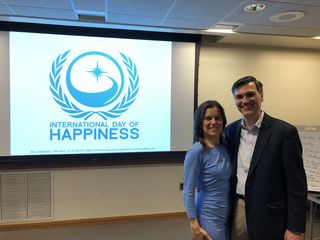Happiness
The Single Most Important Determinant of Happiness
We celebrate the International Day of Happiness today.
Posted March 21, 2018

Twenty years ago, while president of the American Psychological Association, Martin Seligman founded the field of positive psychology, the science of what makes individuals and communities thrive. We know a lot more today about what leads to happiness than we did back in 1998. Chris Peterson, one of the pioneers in the field, argued you could sum up positive psychology in three words: other people matter. And Seligman identifies relationships as one of the five key pillars of happiness in his model of well-being. Called PERMA, Seligman’s model includes Positive emotions, Engagement. Relationships, Meaning, and Accomplishment.
While each of the pillars is important for a well-balanced life, healthy relationships may be the single most important determinant to happiness, according to research. We evolved as social beings, after all. And having close friends or a romantic partner to share our experiences with can add even more meaning to a wonderful life.
Today is the International Day of Happiness. For the past five years, this day has been celebrated by the UN to recognize the importance of happiness in the lives of people across the globe. Schools, businesses and governments everywhere are celebrating this important day in unique ways.
In Philadelphia, the birth place of positive psychology, The University of Pennsylvania’s Positive Psychology Center hosted a free “teach-in” event for the Penn community and public titled “The Knowledge and Practice of Well-Being” that included a number of lectures discussing various facets of happiness. We were delighted to be two of the speakers discussing what science can tell us about well-being and what we can all do to help ourselves and others thrive. We focused our talk on the importance of cultivating happy relationships and presented the research we discuss in our book Happy Together: Using the Science of Positive Psychology to Build Love That Lasts.

We now know that happy relationships – platonic as well as romantic ones – have a powerful impact on our well-being. We also realize that all relationships take work, especially romantic ones. They don’t just magically happen, except in fairy tales, of course. In real life, healthy habits are what lead to long-term love and happiness. To enhance your relationship, practice the following tips:
- Spend a few minutes thinking about your romantic relationship and the typical interactions you have with your partner. Do you tend to focus on problems in your relationship? Or do you tend to focus on opportunities to connect? Ask yourself what specific steps you can take to proactively improve your connection.
-
Focus on what is going right, rather than wrong on your relationship. Since good things happen five times more often than bad things on a daily basis be sure to direct your attention to the positive rather than dwelling on the negative.
-
Identify and use your strengths every day and help your partner to do so as well. Couples who help each other exercise their strengths enjoy greater relational and sexual satisfaction.
-
Practice daily mindfulness to help direct your attention to the good in your partner. Start a simple meditation practice by spending a few minutes each day sitting in a comfortable chair, closing your eyes, and focusing on your breath.
By practicing these healthy habits you will likely increase the quality of your relationships and experience greater happiness. Now that is something worth celebrating on International Day of Happiness!
References
Park, N., & Seligman, M. E. (2013). Christopher M. Peterson (1950-2012). American Psychologist 68(5), 403.
Pileggi Pawelski, S. & Pawelski, J. Happy Together: Using the Science of Positive Psychology to Build Love that Lasts. (2018). TarcherPerigee.
Seligman, M. E. P. (2012). Flourish: A Visionary New Understanding of Happiness and Well-being. New York: Attria Books.


